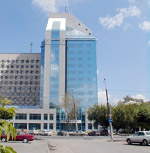Selling the gas pipeline is once again in the center of attention in Georgia. It seems as though there will be certain steps taken after the discussions and that may cause some problems between Georgia and the main sponsor for the gas pipeline -the U.S.
Last year in Washington, the U.S. granted Tbilisi approximately 300 dollars within the framework of the “Thousand Year Battles” project. The grant was provided to reconstruct the gas pipeline under one condition-the gas pipeline had to remain state property.
“They kept on persuading us not to privatize the gas pipeline, but the gas price did go up either way,” said Minister of Economic Reforms of Georgia Kakha Bendukidze. He replied to the statement made by adviser to the State Secretary of the U.S. Matthew Brysen, who claims that the gas pipeline must remain state property so that the country will not have to be dependent on Russia.
“The U.S. should first think about solving its problems regarding energy with Europe and then give advice to Georgia,” said the minister.
“GasProm” is trying to reach its goal, which is to take control of the main gas pipeline through which the “sky blue gas pipeline” reaches the other country located in the Southern Caucasus-Armenia. According to local specialists, this is not about economic interest. This means that Russia will continue to have the most influence on the market economy in the region-even in the case of constructing the Baku-Tbilisi-Erzrum Southern Caucasus gas pipeline and the Iranian gas pipeline which runs through Armenia and Georgia and selling that as well.
We can look at Georgia’s agreement on selling the gas pipeline to Russia as a means of improving relations with “GasProm” so that it can find a way to prevent any increase in gas prices later on. Of course, there is still no guarantee for that transaction. Russia, which owns almost everything in Armenia, didn’t even help Armenia out in the increase of the gas price, when Armenia is the closest strategic ally that Russia has in the Southern Caucasus.
As before, the owners of “GasProm” keep saying that what they are doing has nothing to do with politics and that everything is based on economic interests.
Georgian politician Ramaz Sakvarelidze doesn’t believe that.
“There was a time when it was decided to sell gas to the CIS countries at a special price. That was a political decision. With that said, we can’t really say that the decision to reconsider the gas price has to do with economy. There is some political context to it,” said the politician to “168 hours”. It is clear that we must accept Georgia’s decision to sell the gas route judging from the abovementioned.
The official representative for Georgia’s “GasProm” branch in Georgia David Morchiladze made it clear for journalists that this issue is in the process of negotiations.
“If we come to terms as to what the price will be for gas, then we can consider it a done deal,” he said.
However, the Georgian side differs. Georgian Prime Minister Zurab Noghayideli announced that Georgia will take into consideration the interests of the nation when it comes time to make a decision regarding the gas pipeline.
“We still haven’t thought about the offer made by “GasProm” on privatizing the gas pipeline and turning it into state property. The “GasProm” administration started discussing that at the end of December 2005 during their Tbilisi visit and they refused the offer made by Georgia to cooperate. We offered them to start a joint company where each side would get 50%, but for some reason the Russian side did not approve of that,” said the Prime Minister.
According to sources, the Georgian side states the following requirement in the privatization contract-a 25 year guarantee gas supply with the maximum price of 110 dollars for 1000 cubic meters. Of course, “GasProm” will not object to such things because, after all, it is getting where it wants to go. In response to the question as to whether or not the U.S. has always been against selling the gas pipeline, Noghayideli said once again that Georgia will make the decision based on national interests.
It is good that they place national interests above everything else. But what are they going to do with the abovementioned 300 dollar grant that the U.S. gave them under the condition of not selling the gas pipeline to Russia? Georgia is probably having a rough time answering this question and will leave that for later.

